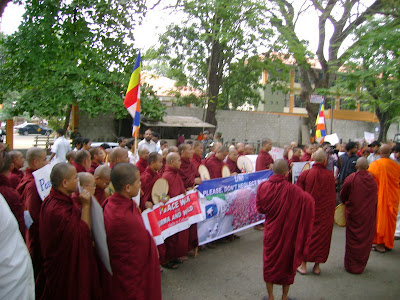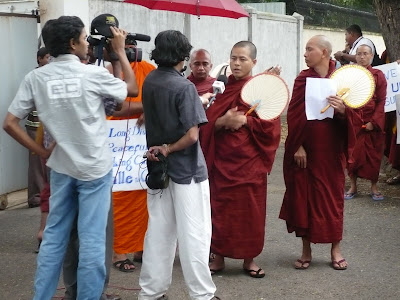I distribute this for yours to get up and act yourself.
Please,... Please Don't depend on Gambri...
We Don’t Do ‘Regime Change’
Jan 28, 2008 Issue
Ibrahim Gambari is the U.N. point man on one of the world's toughest regimes to charm, Burma. Since taking the job in May, Gambari has visited Rangoon several times, urging the junta to respect human rights and recognize the opposition led by Nobel laureate Aung San Suu Kyi. His last two visits came after the bloody September crackdown on monks protesting the rising price of fuel. Gambari is one of few outsiders to meet the secretive and isolated junta supremo, Than Shwe. He spoke with NEWSWEEK'S Patrick Falby on the state of Burma. Excerpts:
FALBY: You briefed the U.N. Security Council before it issued its first condemnation of the junta, then met Than Shwe. How'd it go?
GAMBARI: Um, I was received. [Laughs] The secretary-general [Ban Ki-moon] asked me to deliver some very tough messages to the senior general. In the very hierarchical system that they have, it was important for Than Shwe to hear them: demands for a stop to the killings; a removal of the curfew; removal of the military from the streets of major cities Yangon [Rangoon] and Mandalay; release of persons detained as a result of the crisis, but also release of political detainees, including especially, Aung San Suu Kyi. He was, of course, taken aback because they're pretty isolated. They were somewhat surprised about how the world thinks of them. From their point of view, this was a small minority of monks instigated from outside.
You've gone to Burma twice since the crackdown. How have negotiations gone?
We suggested a commencement of dialogue—the appointment of a government liaison officer to talk with Aung San Suu Kyi. We suggested appointment of a review commission to look at the Constitution. The other suggestion was to establish a poverty-alleviation commission to address the root causes of socioeconomic discontent because, after all, it was the increase in fuel prices that triggered the crisis. They did some of the things; others are still pending.
Many people say these half steps show the regime is not cooperating.
I don't get involved with that. I just want to judge it by what they commit to do and what they do and what we want to do.
They haven't lived up to their commitments.
No, no they haven't but …
You're still optimistic?
I refuse to say whether I'm optimistic or pessimistic. We told them, "These are the things you need to do. I will come back, I will check it on my checklist." There are not many checks yet. But the curfew has ended, the military has been removed from the streets, a large number of detained people have been released—although I was unhappy with the fact that some of them were rearrested or new people were arrested. So far, they've taken some steps—not as far as we want and not on all fronts—but they have taken some steps.
Aren't you worried about looking soft on an international pariah?
No. Either you change the regime or you change the behavior of the regime. I don't have the instruments to change the regime. So if you want to change the behavior of a regime, what do you do? You have to talk.
So are you setting any deadlines for talks?
The talks are long overdue. The release of Aung San Suu Kyi and the other political prisoners is long overdue. Those are also the best way to avoid more sanctions.
Have sanctions worked at all?
Maybe so, maybe not. But if they are combined with real engagement and with some incentives at the appropriate time, they could work.
The junta argues that it is progressing with its "Seven-Point Roadmap." Do you agree?
You can't have a roadmap to democracy that excludes the [opposition's National League for Democracy]. The first step was the national convention, which took 14 years, but they're finished. The next is the constitutional drafting committee, which they have established. The people of Myanmar [Burma], the neighboring countries and the world can't wait another 14 years for the next step.
Many activists say that's not enough.
I was designated special envoy working on this matter only last May. May! This thing's been going on for decades. My predecessor was not allowed in the country for two and a half years. The special rapporteur for human rights was not allowed in for four and a half years. So we're not celebrating, but even if you're not satisfied, what is the alternative? The U.N. is not in the business of changing regimes. What we have the capacity for and the mandate for is to change the behavior of the regime. That's why we have consultations with all the key actors: China, India, ASEAN countries, the United States, the European Union, Japan, Australia.
What are the attitudes of those actors?
If there's any unanimity, it's in support of the secretary-general's office. All of them.
Even China, with all its interests in Burma?
Especially China. They don't want the situation to get out of hand. They have 2,400 kilometers of border and a substantial economic relationship. As a matter of fact, each time I've had difficulty getting the visas, China has been very helpful persuading the authorities to issue visas.





































